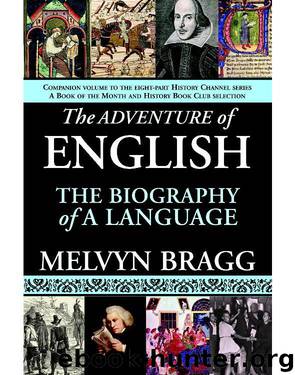The Adventure of English: The Biography of a Language by Melvyn Bragg

Author:Melvyn Bragg
Language: eng
Format: mobi, epub
Tags: Language Arts & Disciplines, Linguistics, Research & Methodology, Reference, Science, General, Research, Historical & Comparative
ISBN: 9781611450071
Publisher: Arcade Publishing
Published: 2011-04-01T06:36:13+00:00
She fed the old hen.
The cow was in the lot.
She has a new hat.
He sits on a tin box.
Spelling began early, simply, at school, through Noah Webster. Monosyllables were easy. Polysyllables were made to appear easy by breaking them down and also by emphasising all the syllables:
A.L. — al P.H.A. — pha B.E.T. — bet I.C. — ic. Alphabetic.
C.E.M. — cem E. — e T.E.R. — ter Y. — y. Cemetery.
It’s still in use and that chanting of syllables by millions of children in tens of thousands of schools over two centuries changed and set the sound of much of American English. Americans pronounce polysyllables with a far more even emphasis than the English. Webster was not an admirer of the English aristocratic clipped vowel and his classroom drill could have been especially designed to oppose it. Where the English say “cemet’ry,” Americans have “cemetery,” English “laborat’ry,” American “laboratory.”
Webster had other ambitions. He wanted to teach America to spell. Correct spelling came to be seen as the standard of a good education throughout America and the famous American spelling bee was born and became part of the social and self-improvement life of every town and village in the land.
This nationwide embrace of spelling as a way to have a night out is remarkable. It shows Americans at their self-help best. It shows that they treat their language with care and seriousness. It continues the John Adams notion that correct speech and spelling is all the vital equipment an American needs to achieve great things. And it was fun; Americans to this day enjoy it. It could also be very serious indeed — shoot-outs are recorded over disagreements down at the local spelling bee.
Like most reformers, Webster appealed to “logic.” “Colour” and “honour” had to get rid of that illogical “u,” and they did. “Waggon” could roll just as easily with one “g,” so one “g” went. “Traveller” lost an “l,” “plough” became “plow,” “theatre” and “center” were turned into “theater” and “center” and so it went on for scores of similar words. “Cheque” became “check,” “masque” became “mask,” “music,” “physic” and “logic” lost the final “k” that English gave them. A great number of these made good sense, though like some others I’m always a bit nervous about tinkering with what has worked well enough. But Webster would not be diverted by any anxieties or nostalgia. He cleaned up the spelling and he set out how to speak the words and he carried most of his countrymen, women and children with him.
America became very confident in its own English language. A witty resolution was proposed in the House of Representatives in 1820 suggesting they educate the English in their own language:
Download
The Adventure of English: The Biography of a Language by Melvyn Bragg.epub
This site does not store any files on its server. We only index and link to content provided by other sites. Please contact the content providers to delete copyright contents if any and email us, we'll remove relevant links or contents immediately.
Cecilia; Or, Memoirs of an Heiress — Volume 1 by Fanny Burney(32548)
Cecilia; Or, Memoirs of an Heiress — Volume 2 by Fanny Burney(31947)
Cecilia; Or, Memoirs of an Heiress — Volume 3 by Fanny Burney(31932)
The Lost Art of Listening by Michael P. Nichols(7494)
Asking the Right Questions: A Guide to Critical Thinking by M. Neil Browne & Stuart M. Keeley(5761)
We Need to Talk by Celeste Headlee(5608)
On Writing A Memoir of the Craft by Stephen King(4935)
Dialogue by Robert McKee(4389)
Pre-Suasion: A Revolutionary Way to Influence and Persuade by Robert Cialdini(4224)
I Have Something to Say: Mastering the Art of Public Speaking in an Age of Disconnection by John Bowe(3878)
Elements of Style 2017 by Richard De A'Morelli(3343)
The Book of Human Emotions by Tiffany Watt Smith(3303)
Fluent Forever: How to Learn Any Language Fast and Never Forget It by Gabriel Wyner(3079)
Name Book, The: Over 10,000 Names--Their Meanings, Origins, and Spiritual Significance by Astoria Dorothy(2979)
Good Humor, Bad Taste: A Sociology of the Joke by Kuipers Giselinde(2945)
Why I Write by George Orwell(2945)
The Art Of Deception by Kevin Mitnick(2796)
The Grammaring Guide to English Grammar with Exercises by Péter Simon(2740)
Ancient Worlds by Michael Scott(2682)
